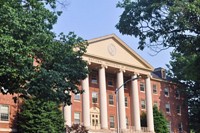Advertisement
Grab your lab coat. Let's get started
Welcome!
Welcome!
Create an account below to get 6 C&EN articles per month, receive newsletters and more - all free.
It seems this is your first time logging in online. Please enter the following information to continue.
As an ACS member you automatically get access to this site. All we need is few more details to create your reading experience.
Not you? Sign in with a different account.
Not you? Sign in with a different account.
ERROR 1
ERROR 1
ERROR 2
ERROR 2
ERROR 2
ERROR 2
ERROR 2
Password and Confirm password must match.
If you have an ACS member number, please enter it here so we can link this account to your membership. (optional)
ERROR 2
ACS values your privacy. By submitting your information, you are gaining access to C&EN and subscribing to our weekly newsletter. We use the information you provide to make your reading experience better, and we will never sell your data to third party members.
Misconduct
Europe’s largest basic science institute gets research integrity office
A nationwide trend for clarity in research misconduct allegations has caught up with France’s CNRS
by Benjamin Plackett
December 3, 2018

France’s National Center for Scientific Research (CNRS) launched its first office of research integrity in August and is now close to finalizing its staff list. The office will investigate claims of research malpractice such as fabricating data.
“It’s part of a general movement in France,” says theoretical physicist Remy Mosseri, the research integrity officer who runs the new watchdog group.
“In most research institutes here, there is now one research integrity officer, but in our case, given our size and the fact that we’re multidisciplinary and operate at a national and international level, it means that we need staff across different fields,” he says.
The CNRS is Europe’s largest basic science research organization with 33,000 staff members and a budget of approximately €3.3 billion ($3.8 billion).
Mosseri will have four staff to help him conduct investigations. The second purpose of the new office is to promote the proper and ethical way of doing research, and a fifth person will focus on that outreach. Mosseri expects to have hired half his staff within the next two weeks.
The office has enough money to cover salaries and anticipated travel, Mosseri says, although the budget is yet to be finalized.
The team will investigate specific claims of research misconduct—chiefly plagiarism, fraudulent results or methodology, and whether researchers have been correctly and fairly credited for the publication of their work.
The office will not investigate other claims of professional wrongdoing, such as sexual offenses.
Before the office was created, claims of poor practice were handled on a case-by-case basis without open and clear procedures. For this reason, the CNRS does not know how many misconduct claims have been investigated in the past, Mosseri said.
Jacques Maddaluno, director of the Institute of Chemistry at the CNRS, wants the new office to ensure every misconduct claim is treated equally.
“With this new office the procedures will be the same for everyone,” he said. “I hope it will remove suspicion that some people are treated better because of their connections.”




Join the conversation
Contact the reporter
Submit a Letter to the Editor for publication
Engage with us on Twitter